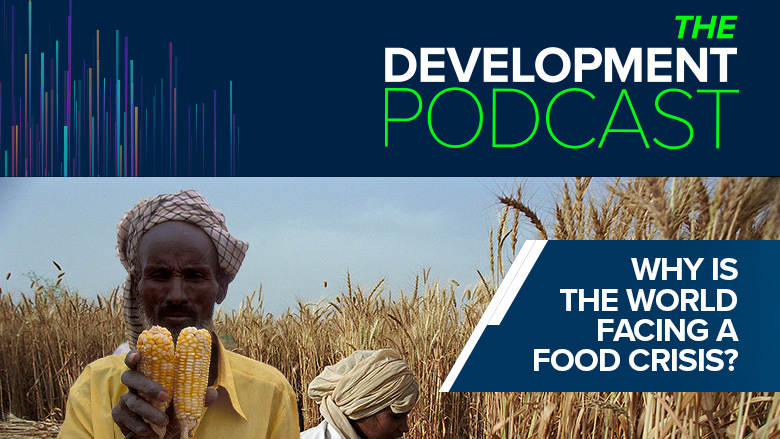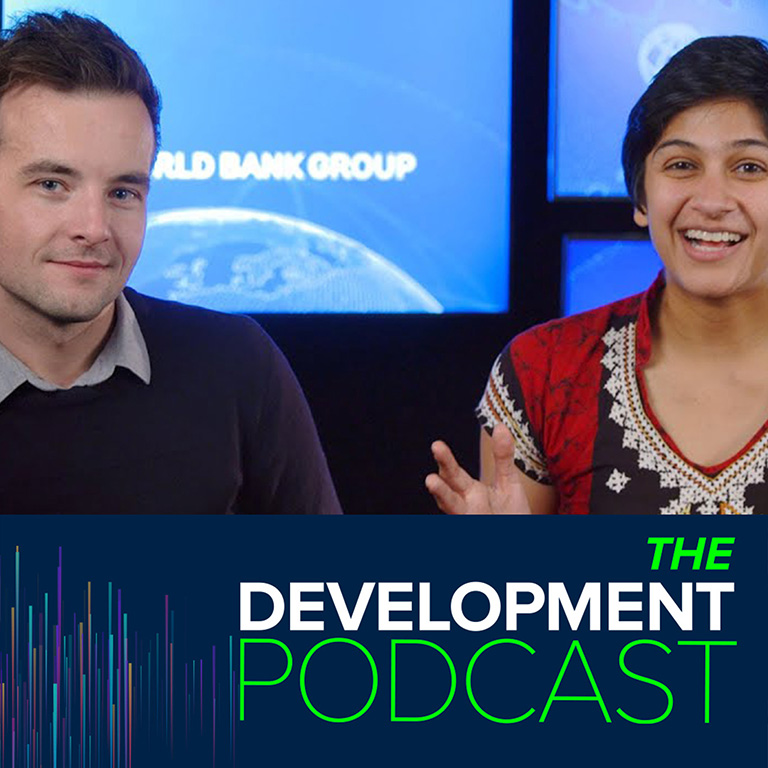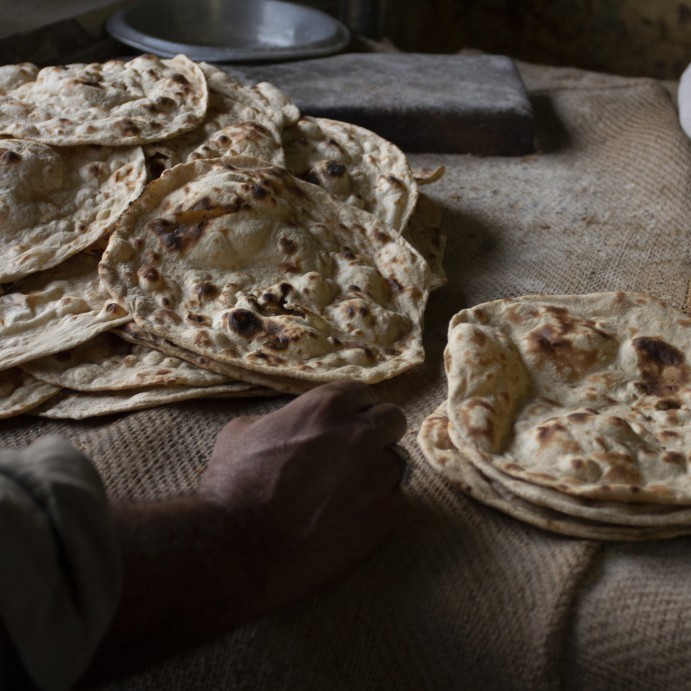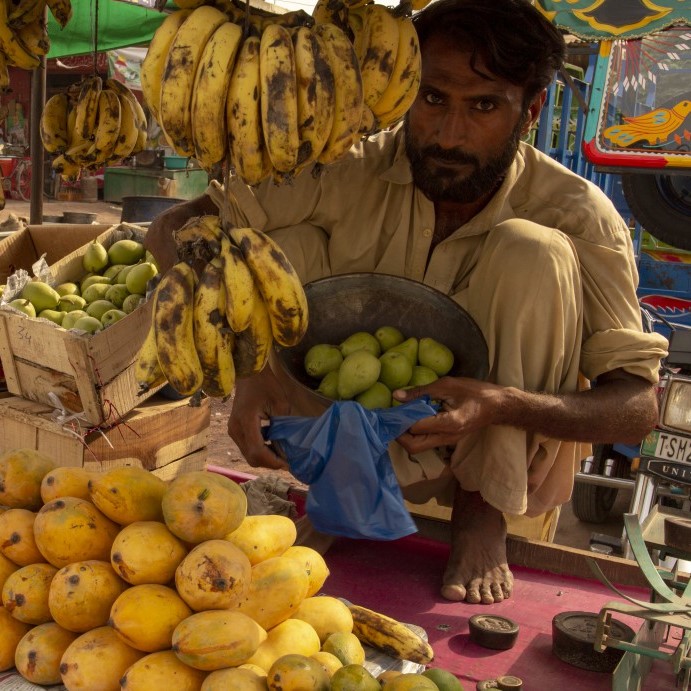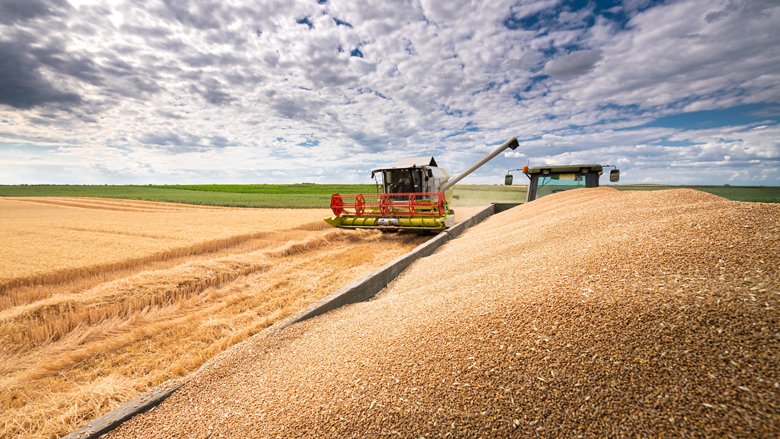The world is facing rising food prices that are hitting poor and developing countries hardest. Even before COVID-19 reduced incomes and disrupted supply chains, chronic and acute hunger were on the rise due to factors, including conflict, socio-economic conditions, natural hazards, climate change and pests.
The disruption caused by the war in Ukraine has added to price pressures, with costs likely to remain high for the foreseeable future and expected to push millions of additional people into acute food insecurity.
In this episode of The Development Podcast, World Bank Food and Agriculture Global Practice Manager Julian Lampietti explains the challenges and discusses some of the solutions. And we hear from a pizza restaurant owner in Cairo who is struggling with the rising cost of bread.
Tell us what you think of our podcast here >>>. We would love to hear from you!
Featured Voices
- Julian Lampietti, Manager for Agriculture & Food Global Practice, World Bank Group
- Dareen Akkad, restaurant owner in Cairo, Egypt
Transcript
[00:00] Raka Banerjee: Hello. And welcome to The Development Podcast from the World Bank Group, coming to you from the United States and beyond I'm Raka Banerjee alongside Paul Blake.
Paul Blake: In today's show is the world facing a food crisis and why are prices climbing so high?
Julian Lampietti: Ukraine accelerated what was already going on which is this very fragile system that's reaching these tipping points more and more frequently. We are facing a massive crisis and there's a lot of problems out there and the way to fix it is to fix the food system overall.
Raka Banerjee: We're talking inflation, Ukraine and asking how people are coping with a supply chain crunch. We get the low down from one business in Cairo.
Dareen Akkad: This is something that's been a daily topic of conversation for the last five years. I think the daily conversation is when is the price hike going to stop?
Raka Banerjee: How critical is the global situation and what is being done to tackle it?
Paul Blake: All that and more coming up over the next few minutes here on The Development Podcast.
[01:32] Paul Blake: So Raka when we've chatted it seems to me that a lot of your work here at the World Bank has focused on agricultural statistics. What do we know about what's happening in terms of agriculture and food in the world right now?
Raka Banerjee: Well, as of a couple weeks ago, the agricultural price index was up 42% compared to January last year and that is a massive increase in prices. And when we look at the increases for specific crops, they're even more alarming. Just to name two maize is up 55% and wheat is up almost double a staggering 91%.
Paul Blake: And how much of that has to do with the war Ukraine?
Raka Banerjee: Not everything but the war has definitely, played a significant role. So together Ukraine and Russia produce 15% of the world's wheat but 30% of world wheat exports and 60% of the world's sunflower oil. And after Canada, Russia and Belarus are the number two and number three producers of potash which is a critical ingredient for fertilizer. And fertilizer prices are now almost three times higher than they were a year ago which is almost definitely, going to affect food production across crops and regions in the coming months.
Paul Blake: So you're mentioning both some significant increases, some worrying numbers and you mentioned there at the end different regions, can you give us some concrete examples?
Raka Banerjee: So the Middle East actually, the World Bank says that already fragile countries like Syria, Lebanon and Yemen are of particular concern. So Syria imports almost two thirds of its food and oil from Ukraine and Russia as well as most of its wheat which comes from Russia specifically. 90% of Lebanon's grain is sourced from Russia and Ukraine and in Yemen where food insecurity is already acute, 40% of wheat is imported from those two countries. So this war and the impact on food exports at a time where we're already seeing rising inflation, it's a huge shock for countries that are already really struggling as a result of the pandemic.
Paul Blake: So this trend in rising prices including food prices that predates the war in Ukraine if I'm not mistaken. What's the backdrop here?
Raka Banerjee: Yeah. The FAO, the Food and Agriculture Organization of the United Nations, it publishes an annual report called the State of Food Security and nutrition in the world. And the most recent addition from 2021 reported that the global prevalence of moderate or severe food insecurity has been slowly increasing actually, since back in 2014. However, in 2020, the increase was as much as the previous five years combined.
Paul Blake: So just wrapping my head around that, the increase in 2020 was equal to the previous five years all added up. That seems like a pretty huge, significant jump. And I'm assuming related to the pandemic, what does that number translate to in terms of actual people suffering from hunger?
Raka Banerjee: So according to the UN, before the pandemic, the estimate for the number of people suffering from severe food insecurity was 135 million and today it's 276 million.
Paul Blake: So jumping from 135 to 276 million.
Raka Banerjee: That's right, just double. And just to be clear, severe food insecurity is really serious. That means actually, running out of food, experiencing hunger. It means having to go entire days without being able to eat that's for severe food insecurity. But if we're looking at more moderate definitions of under nourishment or lacking access to adequate food, the numbers are even larger.
Paul Blake: And can you remind me, has there been a period in time where we've experienced something similar?
Raka Banerjee: Yeah. Actually, people are drawing parallels to the 2007, 2008 food price crisis. People remember the banking crisis and the economic shocks to the financial system at that time but there was actually, also an acute rise in food prices and a resulting crisis because prices for food and agricultural products more than doubled between early 2007 and mid 2008. Actually, that's when people realized how little we knew about the agricultural sector, in general and that's why I started working at the World Bank. There was a huge push at that time to improve agricultural statistics and as a result of the crisis, it's estimated that 155 million people in emerging markets and developing economies were pushed into extreme poverty.
Paul Blake: That's extraordinary. I mean, 07, 08 wasn't that long ago and the idea that we didn't know as much or didn't have a sense of how significant the situation was that I don't know, a bit mind blowing.
Raka Banerjee: Yeah. No, I mean, the good news is we have a lot more data now. The bad news is, it's still really bad.
Paul Blake: Well, as we've just heard supply chain disruptions due to the war in Ukraine have led to price increases on top of price increases. And these are growing concern for countries which import a lot of their food in particular, their grains. We're going to be getting some insights in a few minutes from the World Bank's Julian Lampietti on the big picture for global food supplies. But first let's focus in on North Africa, specifically, Egypt.
[06:47] Raka Banerjee: Bread is very much a dietary staple in Egypt for a high percentage of its population and the country imports a lot of its wheat from Ukraine and Russia. So with prices up and ongoing concerns over supply, how are people in the hospitality sector coping? What happens when your entire business model is based on bread?
Paul Blake: Let's hear from busy and bustling Cairo. Producer, Sarah Treanor spoke to one restaurant tour about her business and how food costs are an everyday topic of conversation.
Sarah Treanor: Traffic sounds in Egypt's mega city Cairo, with a rapidly growing population of over 10 million. An increasing population means increasing demand for food and with price rises, this is a daily concern for many especially, those in industries which rely on food imports.
Dareen Akkad: My name is Dareen Akkad. I am based in Cairo, Egypt. I live here with my husband and three children. I'm a passionate bread maker. I started making bread when I was pregnant, my first child and haven't stopped since. I think it's just the smell of bread is the best smell in the world.
Sarah Treanor: Dareen took her passion for bread making and turned it into a business, a restaurant called What the Crust.
Dareen Akkad: So we specialize in making authentic traditional Neapolitan pizza. We have a seal of approval from Associazione Verace Pizza Napoletana which is an organization based in Naples. Let's say it tries to protect and promote the traditions of the authentic Neapolitan pizza. So that means a lot of my ingredients come from that specific region of Italy which is Campania.
Sarah Treanor: But water about bread itself.
Dareen Akkad: It's just flower, water and salt and maybe some yeast.
Sarah Treanor: And bread says Dareen, plays a big role in Egyptian life.
Dareen Akkad: I think this is something that's often said when people talk about bread in Egypt, is that the word for life in Egyptian Arabic is aish and it's also the word for bread. So life and bread are one word and I think that just explains everything about how Egyptians feel about their bread. In Egyptian culture today, we still make bread the way the Pharaohs made them in rural areas of Egypt. We still use the same, they call this baladi oven so the local original oven that the Pharaohs used. That also means that Egypt has a problem with supply because this is a growing population, we're over a hundred million people, we consume more bread than we produce. So most of the wheat that is used in the making of everybody's daily bread, it has to be imported.
Sarah Treanor: But the latest food price rises that Dareen has seen come on top of already escalating costs.
Dareen Akkad: I mean, this has been a subject of conversation already for at least five years. Everything's always getting more expensive and unfortunately, the salaries aren't increasing in parallel with the inflation rates. This is an ongoing crisis let's say for us. So we are in a position where we have to wait and see what's going to happen next. Because we rely on imports, we've had to buy things in bulk. So we get a shipment every few months, we have to do some demand planning and try to forecast how much wheat and cheese and tomatoes we're going to be using. And so far, because I mean, these events have been happening over the last three months. We've been using up the stock that we've had and that we've paid for before this price hike. But we have a new shipment coming and we know that everything's gotten more expensive but we can't really find out how much more expensive until it actually, gets cleared and passes through the customs.
Sarah Treanor: And this means increasing pizza prices.
Dareen Akkad: Inevitably, we're going to have to increase our pizza prices. We haven't had to so far but we have to wait and see by how much.
Sarah Treanor: Dareen says that food costs are never far from people's minds.
Dareen Akkad: Definitely. I mean, again, this is something that's been a daily topic of conversation for the last five years. I think the daily conversation is how much worse, when is the price hike going to stop? A watermelon now is for 80 Egyptian pounds and for many Egyptians that might be their daily wage and they're more certainly, not going to spend it on a watermelon.
Sarah Treanor: Switching to homegrown produce is one route that she wants to explore.
Dareen Akkad: One of the ways that we have to plan is to find products that we can create that rely less heavily on imports and more so on locally grown ingredients or let's say even if it's locally processed ingredients, I know we don't make enough wheat in Egypt and that some of the Egyptian flour that we use is actually, originally maybe a Ukrainian. But I believe that given the right training we could achieve world-class produce in Egypt without having to import it. I'm going to look for ways to either start growing my food myself or making my own cheese, maybe trying to see if that is something we can even export. And we're trying to find ways to use our brand equity to stay alive and promise better things and that those better things are going to depend less on imports and more on local produce.
Paul Blake: The pretty enticing sounds of bread going into the oven at What the Crust restaurant in Cairo, thanks to Sarah Treanor for that report and to Dareen Akkad for speaking to us.
Raka Banerjee: Well, listening to that was Julian Lampietti, manager for global engagement in the agriculture and food practice here at the World Bank.
[13:08] Paul Blake: Julian, welcome. And thanks for being with us today, David Malpass the World Bank president said last month that the world faces quote "a human catastrophe" from a food price crisis related to the war in Ukraine. Those are some pretty strong words, just how acute is the problem?
Julian Lampietti: Thank you for having me and thank you both for this. So we are facing a crisis, there is no doubt. Now, it's due to a whole confluence of factors and I think what we're seeing is a tipping point in the system. The war in Ukraine just accelerated what was already happening, we have this food system that feeds us and it's wonderful but it's also destroying the planet as it does that. And it's getting more and more unstable and we're facing the second food crisis in 10 years, Ukraine accelerated what was already going on which is this very fragile system that's reaching these tipping points more and more frequently. So we are facing a massive crisis and there's a lot of problems out there and the way to fix it is to fix the food system overall.
[14:21] Raka Banerjee: When we're talking about the overall food system, are we talking about availability issues or people's access to food or the production of food?
Julian Lampietti: Well, so different crises have different origins. And if we go back to 2008 it was definitely, a question of availability. There were certain markets where, a rice market in particular which is very thinly traded and you had a shock there that then started translating to all the other markets. In the case of this crisis that we're facing today, it's definitely an access problem rather than an availability problem. So on a large scale, Ukraine is less than 2% of the total amount of grain produced in the world. And so it's a fairly small fraction, it is a big part of what's traded though. So between Ukraine and Russia, we're talking about 30% of what's traded. So since 2008, the world has increased production by about 5 billion tons and stocks have increased by about 300 million tons. So there's more food in the world today than there was before and there's more than enough to go around. The problem is it's not in the right place and available to the right people that really need it.
Paul Blake: And what's creating that problem, why isn't in the right place, why isn't it getting to the right people?
Julian Lampietti: So I think that a lot of it started with COVID and the supply chain problems we started seeing with COVID. You remember that the farmers had plenty of food on the farm but they weren't able to get that to the grocery stores. And right here in Washington, DC, you could go to the grocery store and not find basic things like flour, that didn't mean that flour wasn't there somewhere. I mean, the wheat was being produce,. We've had higher yields in the last few years than ever before in history. But getting that from the farm to the fork is a complicated cumbersome process that involves lots of different players. And COVID really disrupted that supply chain, basic people getting sick all along the supply chain not being able to move things, different kinds of trade issues that started. And then it starts getting exacerbated when the price of good starts going up due to inflation and all sorts of other factors that are going on.
Paul Blake: And I imagine those supply chains didn't, they weren't built and they didn't evolve assuming that a once in a century a pandemic was going to come around and disrupt things.
Julian Lampietti: Well, exactly. And what we've seen is, we've seen that our agricultural markets and systems have become increasingly concentrated. So you may remember all the problems we had with meat in this country, in the US. And so there's four big slaughter houses through which something like 80% of the meat is processed in the United States. And people start getting sick and dropping out of those slaughter houses, you have a major shortage. And at a global level, our supply chains are very concentrated and that makes them very fragile to disruptions and so the Black Sea is a major conduit for grain out of countries like Ukraine and Russia and be Belarus into the Middle East and suddenly that's mined and blockaded and it disrupts the entire system. And it's really hard to figure out how to route everything in different ways and it's very expensive to do that.
[18:05] Paul Blake: Well, speaking of the Middle East, we heard just a few minutes ago from Dareen and Cairo and she was talking about how food prices have been rising for a number of years and how it's affecting her and her business. Looking ahead, do you think the situation could actually, get worse especially, in the short term?
Julian Lampietti: Yeah. Great question and one that really keeps me up at night. So it can definitely, get worse and the reason it can get worse is that the prices of fertilizer, the prices of agricultural inputs overall and the cost of capital are all going up really quickly. And when those things go up and the farmer's not able to make additional money growing their crops, their incentives to produce a lot more start going away. All of the large food producing countries like Brazil or the US or others are big fertilizer importers. So the shortages of fertilizers that we're seeing are going to cause problems and we really need to focus on how to get production going and get that fertilizer moving around the world so that we don't have a shortage or a shortfall next year.
[19:22] Raka Banerjee: So you mentioned the 2007, 2008 food price crisis. What were the lessons learned from that time now that we're again, facing these huge food pricing increases?
Paul Blake: And maybe give a little history of what that crisis was for folks who might not know.
Julian Lampietti: So that crisis really started in the rice markets and what we saw was rapid transmission to all sorts of other agricultural markets. And what we observed globally is very low levels of storage, of big agricultural commodities. They had been going down for years and very low levels of agricultural investment in production. So that combination of factors as well as a number of others really contributed to this rapid escalation of prices that then went down with the response but then went back up again a couple of years later till they finally petered out and we put in place an architecture that seemed to improve a lot of what we did. One of the things we learned is that if we have better information about what's going on and where the food is and what the stocks are, people get less panicky and I'll give you a very specific example.
Julian Lampietti: My wife, when there's a announcement of a snowstorm in Washington, DC, she runs down to the grocery store and buys more groceries even if our pantry is full and that just creates a shortage in the grocery store for the next person. And so we need to make sure that people are getting the right information and they know that there's plenty of food out there and that people are working on getting it to them so that we don't actually, shoot ourselves in the foot in this process.
Julian Lampietti: Other key lessons are, it's really important to move quickly and in a timely way to get people enough that they can pay for the food they need, for the hungry people, for the people that are facing nutrition problems for the poor people and cash transfers are generally the very best way to do that. So rapidly expanding social safety nets in order to respond to a food crisis are really key. And then the second is you need to stop people from engaging in bad behavior, discourage them from doing things that are actually, making the problem worse. So you don't want to see people hoarding, you don't want to see people creating export bans and other things like that. And I would say those are two really important lessons that come out of the previous crisis.
Raka Banerjee: So basically, getting information to people and getting support to people who really need it. You mentioned all this, also the supply chain, that part of the information is letting people know that the food stocks are there and it's just about getting it to them. How do those issues get resolved?
Julian Lampietti: Well, the food markets of the world are the largest, most sophisticated markets and they work really well. I mean, we're connecting 600 million food producers with 8 billion consumers at a global level, that's amazing if you think about it. And we need to let those markets work and do their thing and providing information, providing liquidity where there's constraints in financing, making sure that people have access to the right inputs and information are always, we can enable these markets to work and really discourage people from engaging in beggar-thy-neighbor policies and other activities that stop those markets from working properly.
Paul Blake: We're talking about this human catastrophe, this food crisis that's happening, where is it happening right now? Is it in the immediate vicinity of the war Ukraine, is it global? What can we say about where this is happening?
Julian Lampietti: So what we know is it's made problems in particularly large food importing and we, importing countries are much worse. And so places like Afghanistan and Yemen that were already facing very difficult situations are now facing even harder ones. And I think it is David Beasley, the head of the World Food Program, who said the other day, they've gotten to the point, the food's gotten so expensive to import because it was coming in from the Black Sea region. Now, they're taking from the hungry to feed the starving and so all those usual hotspots are a problem. And now we're starting to see a lot of hotspots emerge in, for example, the horn of Africa, parts of West Africa and of course the Middle East countries. Most of them are fairly well off but they're starting to really face some challenges because they have such a large import bill.
[24:07] Raka Banerjee: Going back to the interview with Dareen, the restaurant owner in Cairo and she was talking about wanting to source ingredients more locally and more sustainably. And I'm wondering, are there agricultural and food technologies that can help to feed a growing population sustainably?
Julian Lampietti: So there are lots of technologies and there's going to be a lot more agritech investment that's going on. This is a really hot area and I mean, I'm sure you've heard about biotechnology and all the incredible things that can be done with that, sometimes controversial. The one I want to focus on is this idea of the application of digital technology in agriculture which I think is really going to be transformative. And you think about digital technology is really about passing information from one place to another faster and collecting it faster and processing it faster. And if you think about fertilizer and the problems here, the price of fertilizer's gone way up, it's hard to get and what can we do? Well, we can use digital technology to be much more specific and accurate in our application of that fertilizer in the field. When I was a kid growing up and I drove a tractor around, we would pour the fertilizer into the hopper and drive around and spread it all over the field and then we are done.
Julian Lampietti: Today, that tractor has a GPS system, it has all sorts of sensors on it and it puts just the right amount of fertilizer in just the right place so you could be much more efficient. Now, you could translate those technologies from large farmers to small farmers. It requires investment, it requires extension but it can be done. And so increasing the efficiency of fertilizer use in a situation where you're facing these high prices and problems for farmers in terms of putting it on their fields is a really good way to deal with the kind of challenge we're facing today and hopefully enable us to have good cropping seasons the next few years.
Paul Blake: So it's a potential silver lining, higher prices could lead to that investment that would ultimately, benefit people in developing countries.
Julian Lampietti: Yeah, so exactly right. The higher prices will force the advent of some of these new technologies. There's also incredible things that happen in a supply chain due to digital technologies and precisely, around the idea of local sourcing. So just think about how during COVID people started, municipalities, counties started putting all their farmers online and the products they had on their farms and so people could actually, go straight to the farms to get the products that they couldn't get in the grocery stores because they were blocked for various reasons. And that kind of dissemination of information could help our Egyptian baker figure out where there is local wheat that they could source to put into their products more easily and at a lower cost.
Julian Lampietti: So, one way I like to think about it is that if you have these 600 million farmers and these 8 billion consumers and all the food is passing through these really narrow supply chains, very concentrated supply chains, you've become very fragile. And if you can use information technology to connect those producers in what would be a web as opposed to a single supply chain, you're going to build a much stronger architecture just like a spider's web with lots of lines going between all the different points.
[27:45] Raka Banerjee: Can you share about how the World Bank is responding to this crisis? Is it helping to develop these networks?
Julian Lampietti: We're doing a lot of things about this and as you probably, know we just announced a $30 billion program to respond to the crisis. We're working very closely with the G7 and other like-minded groups to support a global effort around this, to make sure that we are analyzing the problem and figuring out where the resources should go. It's really four big buckets of what we want to do going forward. And one is we absolutely, have to make sure that the hungry and the poor are getting what they need to be fed and to be safe. The second is we need to make sure we're not doing silly things when it comes to trade to keep trade open and encourage countries to trade with each other. The third is really getting the farmers what they need to keep farming and to respond to the opportunity that is here.
Julian Lampietti: So creating a supply response for the next two years as we weather the storm around fertilizer and fuel prices. And then fourth, everything we do needs to be tied to building a more resilient food system rather than destroying our planet as we try to feed ourselves is a system that can be a great sink for greenhouse gases. It can be a great home for biodiversity, it can be a creator of environmental values. It can be a source of good nutrition and on and on. And good jobs rather than the opposite which is what's going on now.
[29:32] Paul Blake: All right, Julian, thank you so much for taking the time to talk today. This has been fascinating.
Julian Lampietti: Thank you for having me.
Paul Blake: Julian Lampietti who I just learned is not just an economist but a farmer himself joined me here in the studio in Washington, DC.
Raka Banerjee: Well, that's about it for this episode of The Development Podcast.
Paul Blake: As always, we'd love to hear from you drop us an email at thedevelopmentpodcast@worldbank.org.
Raka Banerjee: From me, Raka Banerjee and my buddy Paul Blake, we'll see you next time.
ABOUT THE DEVELOPMENT PODCAST
This international development podcast brings together the data, research—and solutions—that can pave the way to a sustainable future. Through conversations focused on revealing the latest data, the best research, and cutting-edge solutions, let us introduce you to the folks working to make the world a better place. Don't miss an episode! Listen and subscribe for free on your favorite platform. And rate our show! ;)
Tell us what you think of our podcast here >>>. We would love to hear from you!
ABOUT THE WORLD BANK GROUP
The World Bank Group is one of the world’s largest sources of funding and knowledge for low-income countries. Its five institutions share a commitment to reducing poverty, increasing shared prosperity, and promoting sustainable development.
